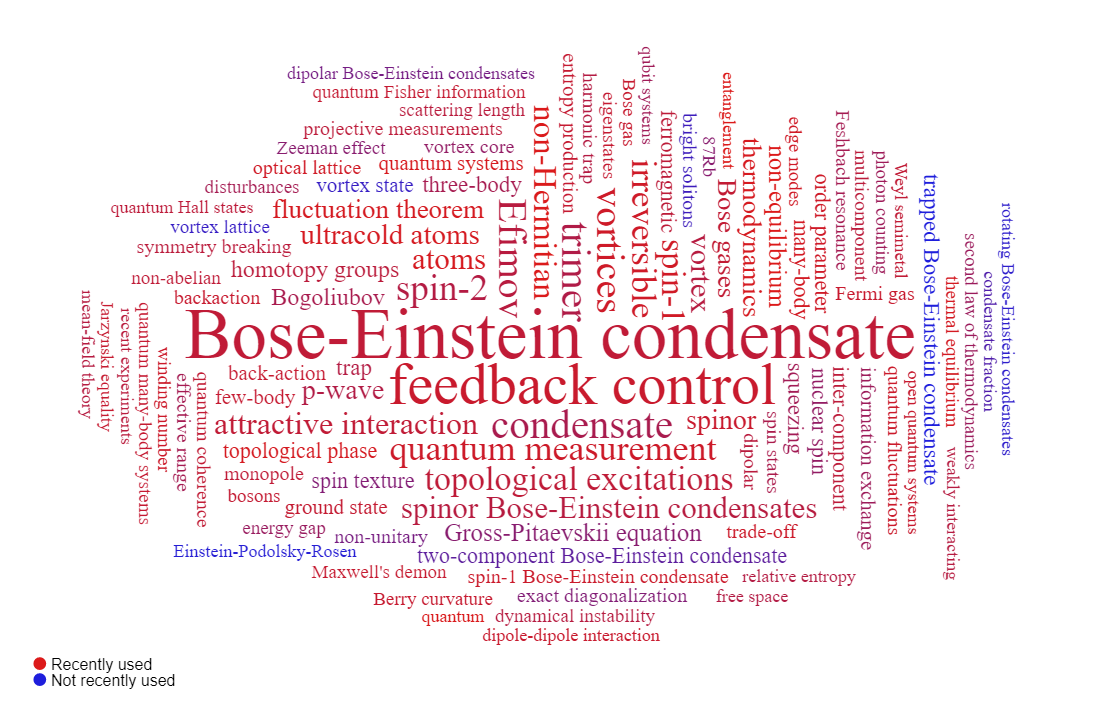TOPICS
- Bose-Einstein condensation, fermionic superfluidity, topological phenomena, reservoir engineering
- Quantum information, measurement theory, information theormodynamics
With recent advances in nanoscience, it has become possible to precisely measure and control atoms, molecules, and photons at the level of a single quantum. We are interested in theoretically studying emergent quantum many-body problems in such highly controllable systems and developing nanoscale thermodynamics and statistical physics that lay the foundations of such problems.
Our particular focuses in recent years include many-body physics of ultracold atomic gases and unification of quantum and statistical physics and information theory. Atomic gases which are cooled down to nearly zero temperature by laser cooling techniques offer unique opportunities for studying macroscopic quantum phenomena such as a Bose-Einstein condensation (BEC) in controlled manners. Unprecedented controllability of such gases also enables us to simulate phenomena analogous to condensed matter and astronomical physics, to investigate their universal properties, and to explore unknown quantum many-body physics. In our recent works, we have studied topological excitations and correlation effects in spinor BECs, BCS-BEC crossover and Efimov physics under the control of an atomic interaction strength, quantum Hall states in synthetic gauge fields, and thermalization of isolated quantum systems. We are also interested in relating fundamental concepts of quantum and statistical physics with information theory and exploring interdisciplinary fields that unify physics and information. In particular, we have recently worked on generalizations of the second law of thermodynamics and fluctuation theorems and the formulation of the dynamics of state reduction in light of information flow under measurements and feedback controls.
Annual Reports
PDF files (Japanese/English): 2022 / 2021 / 2020 / 2019 / 2018 / 2017 / 2016 / 2015 / 2014 / 2013 / 2012
Link to the annual reports of the department

Keyword could generated by Scimeter
- Bose-Einstein condensation, fermionic superfluidity, topological phenomena, reservoir engineering
- Quantum information, measurement theory, information theormodynamics
With recent advances in nanoscience, it has become possible to precisely measure and control atoms, molecules, and photons at the level of a single quantum. We are interested in theoretically studying emergent quantum many-body problems in such highly controllable systems and developing nanoscale thermodynamics and statistical physics that lay the foundations of such problems.
Our particular focuses in recent years include many-body physics of ultracold atomic gases and unification of quantum and statistical physics and information theory. Atomic gases which are cooled down to nearly zero temperature by laser cooling techniques offer unique opportunities for studying macroscopic quantum phenomena such as a Bose-Einstein condensation (BEC) in controlled manners. Unprecedented controllability of such gases also enables us to simulate phenomena analogous to condensed matter and astronomical physics, to investigate their universal properties, and to explore unknown quantum many-body physics. In our recent works, we have studied topological excitations and correlation effects in spinor BECs, BCS-BEC crossover and Efimov physics under the control of an atomic interaction strength, quantum Hall states in synthetic gauge fields, and thermalization of isolated quantum systems. We are also interested in relating fundamental concepts of quantum and statistical physics with information theory and exploring interdisciplinary fields that unify physics and information. In particular, we have recently worked on generalizations of the second law of thermodynamics and fluctuation theorems and the formulation of the dynamics of state reduction in light of information flow under measurements and feedback controls.
Annual Reports
PDF files (Japanese/English): 2022 / 2021 / 2020 / 2019 / 2018 / 2017 / 2016 / 2015 / 2014 / 2013 / 2012
Link to the annual reports of the department

Keyword could generated by Scimeter